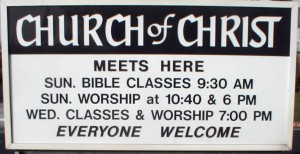 See?!? Pudge did throw out the first pitch from behind home plate!
See?!? Pudge did throw out the first pitch from behind home plate!
~~~~~~~~~~~

Today, we jump back into the middle of our chapter-by-chapter review of Leroy Garrett’s “What Must the Church of Christ Do to Be Saved?” I appreciate so much the encouragement you’re giving me via phone, email, text, and quick hits in the church foyer. I really do appreciate it. Again, the ideas and ideals presented in this book are important. The conversations they provoke are critical and must be had if we are to remain a viable voice in the greater Christian community.
Garrett’s seventh suggestion takes us back to the beliefs and practices of one of our early Church of Christ pioneers:
Resurrect the spirit of J. W. McGarvey.
 McGarvey (1829-1911) studied at the feet of Alexander Campbell at Bethany College and became one of the best known and most highly regarded preachers in the Stone-Campbell movement. Throughout Kentucky and Tennessee, and beyond, McGarvey’s scholarly credentials were unmatched and unquestioned. He wrote a popular and highly influential commentary on Acts that still impacts a lot of our heritage today. And he vigorously, adamantly, unflinchingly opposed instrumental music in worship.
McGarvey (1829-1911) studied at the feet of Alexander Campbell at Bethany College and became one of the best known and most highly regarded preachers in the Stone-Campbell movement. Throughout Kentucky and Tennessee, and beyond, McGarvey’s scholarly credentials were unmatched and unquestioned. He wrote a popular and highly influential commentary on Acts that still impacts a lot of our heritage today. And he vigorously, adamantly, unflinchingly opposed instrumental music in worship.
He fought against organs in our churches for decades. He fought hard. He was the first to argue that instruments in the church was a sin. McGarvey is the one credited with forming our arguments against instruments, including the “argument from silence” (which I once used passionately, even though I knew it didn’t make sense). Yet, while he argued and debated against the instruments in corporate worship, he absolutely refused to divide over the issue. That mindset — we can disagree without dividing; disagreeing is fine, dividing is a sin — is what Garrett says must be resurrected among our people.
[McGarvey] lived in the eye of the storm of the controversy that led to the separation of Churches of Christ, formerly recognized in 1906. It is noteworthy that in spite of his opposition to the organ, he refused to make it a test of fellowship, and when the Churches of Christ finally separated over the organ question, he refused to go along. He believed that the Movement did not have to divide over such differences, that there could be “organ” churches and “non-organ” churches and still maintain fellowship.
Even though he left his old home church when it brought in the organ, he did not break fellowship with that church. He still visited and occasionally preach for them, and that is where his funeral was conducted. In short, McGarvey was not a sectarian or an exclusivist. If the Churches of Christ are to be saved, they must resurrect the spirit of McGarvey. Like him, they can be strong in their convictions, including being non-instrumental, without consigning to hell all those who believe and practice differently. Like McGarvey, the Churches of Christ must not make a cappella singing a test of fellowship. Again, like McGarvey, we can even say that for us instrumental music would be a sin in that it would violate our conscience to use it in worship, but we must not make it a sin for others. We must allow for honest differences on such issues.
Garrett also points out in this chapter that David Lipscomb couldn’t understand that McGarvey was opposed to instruments in worship but also supported missionary societies. He didn’t see how McGarvey could be opposed to multiple cups for communion and, at the same time, teach and preach in favor of cooperative efforts among different denominations.
McGarvey couldn’t be labeled. He couldn’t be pegged. That’s the beauty of his outlook, his theology, his practices. He sounds so “Church of Christ,” but he was actually of the “Disciples of Christ” stream. How he believed and behaved, how he lived his faith, didn’t make sense to those who were looking to accuse and judge. And we should be the same way.
We ought to be able to study and reflect on the Scriptures and church history and our own faith and reach our own conclusions, as individuals and as congregations, without binding them on anybody else. When we believe and practice based on our own understandings of truth and grace (both!), we will inevitably reach conclusions that don’t fit comfortably on anybody’s A-B Line of reasoning. You can at once be for trashing all the computers and PowerPoints and yanking the screens down from the worship center in order to use song books and, at the same time, push for women to be involved in the serving of communion. You can wear a suit and tie and refer to your church family as “brethren” and, at the same time, sing on the praise team and read from The Message. You can sing When I Survey the Wondrous Cross with the band and still schedule Sunday night church and insist on an invitation at the end of every sermon. It won’t make sense to those who want to label and divide. But it’s what’s best for all of us. It’s a proactive way of doing things, not reactive. It’s not a compromised position, it’s the responsible position. Disagree without dividing.
It disturbed Lipscomb that McGarvey would fellowship “brothers in error,” a bromide we have hung on ourselves all these years. McGarvey realized that those were the only ones he had to fellowship, for we are all in error about some things. That is precisely the point of Christian fellowship — that we accept each other as Christ has accepted us (Romans 15:7), and that includes all hang-ups, warts, and errors of all sorts. As Christ accepted us! Were we all free of error and right about everything when Christ in his love and mercy accepted us? How compelling!
[McGarvey] preached for “organ” churches during most of his long ministry, and he insisted that they not defer to his scruples during his visit. This he did because he understood what the fellowship of the Spirit is about. It transcends differences over secondary matters.
Peace,
Allan
 (Commenting on this or any post since September 20 will automatically enter you into the drawing for the books to be given away in conjunction with this blog’s upcoming 1,000th post. See the September 20 and September 21 posts for details.)
(Commenting on this or any post since September 20 will automatically enter you into the drawing for the books to be given away in conjunction with this blog’s upcoming 1,000th post. See the September 20 and September 21 posts for details.) Sincere love is difficult. Devotion based on brotherly love isn’t easy. It demands that we detest what is evil in our friend’s lifestyle or attitudes. We “love the sinner but hate the sin.” Our love for the person committing the wrong is real, not pretended in any way; but in sincere love we must abhor the evil that can only cause him or her harm.
Sincere love is difficult. Devotion based on brotherly love isn’t easy. It demands that we detest what is evil in our friend’s lifestyle or attitudes. We “love the sinner but hate the sin.” Our love for the person committing the wrong is real, not pretended in any way; but in sincere love we must abhor the evil that can only cause him or her harm.








Recent Comments